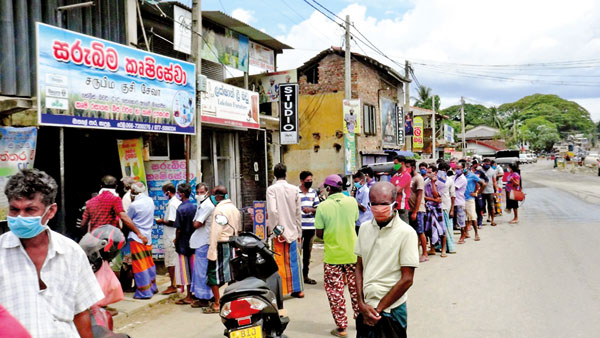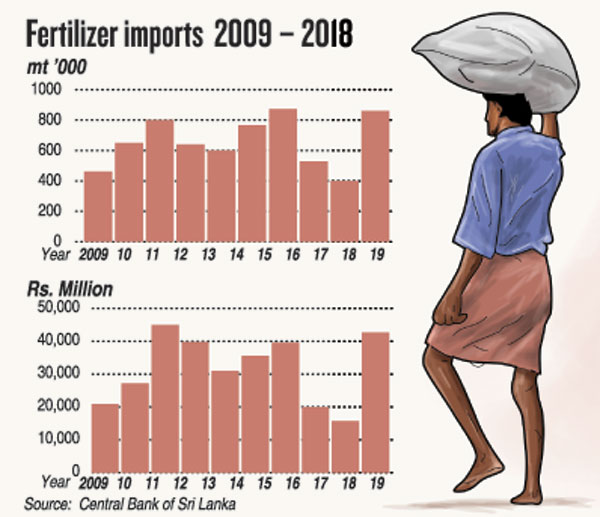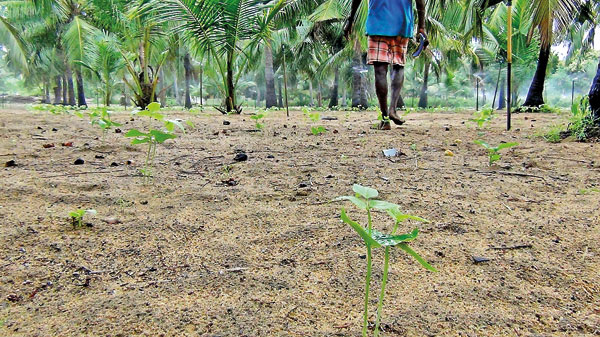News
Farmers fed up of waiting and waiting for non-existent, substandard fertiliser

Dambulla: A familiar sight, long queue for fertiliser. Pix by Kanchana Kumara, Hiran Priyankara and Mahesh Keerthiratne
Rice, vegetable and fruit growers say delays in fertiliser distribution could be damaging and organic substitutes will not meet urgent needs.
Farmers say the shortage has persisted for more than five months now and that government fertiliser is substandard.
All-Island Farmers Federation Secretary T.B. Sarath said the fertiliser shortage has badly affected coconut and banana plantations as well as rice growers.
He said the expected harvests could be at risk.
Mr Sarath said fertiliser had been in short supply for more than five months because private companies stopped imports following presidential election promises by both main political parties to give fertiliser free. And when importers began purchases at the beginning of the year, the coronavirus pandemic put a stop to that.
And then, due to the quarantine curfew, agro chemical shops were closed. Government distributionw was halted.
Farmer Sudath Ranasinghe, who grows coconut and banana in the same land, said that after he switched to compost there was a 90% reduction in output.
He fears his harvest will fail without chemical fertiliser.
Mahinda Bandara Ranweera, who grows rice and vegetables at Hingurakgoda in Polonnaruwa, said the delay meant paddy farmers had been forced to plant seedlings and add fertiliser later.
“We mix fertiliser with the soil before paddy seedlings are planted so they would get nutrients from the beginning. However, due to the delay in fertiliser distribution, we could not do that. Now our crop is susceptible to damage,” he said.
He said he had been forced to travel 30 kilometres to state fertiliser stores in Gallella area. A 50kg fertiliser bag costs Rs 1,000.
Another rice farmer, R.G. Ananda, said since he had prepared carbonic fertiliser and compost using waste from his chicken farm, he was able to ride over the shortage of chemical fertiliser. “But, other farmers are unable to do so, as they have over five acres of farm land,” he said.
Even though government officials warn of possible fertiliser shortages, they also need to educate farmers on how to create and use organic fertiliser.
Milina Ratnasili Kumari, 43, a farmer in Polonnaruwa, said she had been forced to cultivate paddy and green gram without the promised free fertiliser.
More farmers said they are unable to mass produce compost for paddy fields, which extend over 10 to 15 acres.
Vegetable farmers in Yatawatta in Matale are also struggling without fertiliser.

D.M Chaminda: Fed up of waiting at long lines to get fertiliser
Farmers in Dullewa, Walachela, and Unaweruwa, who grow cowpea, tomato, brinjals, and beans, have prepared their farmlands and planted seeds, but do not have fertiliser.
They have not been able to get urea and other chemical fertilisers. They also said fertiliser distributed by the government is substandard.
The Sunday Times has noticed that most of the crop in Matale is malnourished.
A paddy farmer in Yatawatta, Mr U.G Somapala, said he had not received fertiliser and that the three to four kilos given by the government is not enough.
“We are trying to grow vegetables. If we don’t get the fertiliser on time we will not get a good harvest. It doesn’t matter even if the fertiliser is given at higher prices. We ask that the government create a practical distribution system,” he said.
Another farmer, D.M Chaminda, said that he is fed up of waiting at long lines to get fertiliser.
“There is heavy rain now and if we don’t get fertiliser on time, our crops will be destroyed,” he said.
Fertiliser is not available at Govi Jana Sewa centres or fertiliser shops. So the farmers are asking the government to create a program under which they can buy fertiliser in the open market, or for higher prices.
Agriculture Department Director General W.M.W. Weerakoon, admitted fertiliser distribution shortcomings.
He said the National Fertiliser Secretariat has been asked to time their distribution to meet grower needs. “Fertiliser should be added to plants at different stages. We are trying our best to distribute fertiliser at the right time.”
Grama Niladhari’s have also been advised to issue fertiliser. Phosphorus will be provided to every Grama Niladhari area.
Mr. Weerakoon said the government has begun fertiliser purchases from overseas and hopes the situation will improve as the virus pandemic eases.
The director of the National Fertiliser Secretariat, Mahesh Gamanapila, said supplies can’t keep up with demand from farmers and those growing in their gardens.
He said consignments of fertiliser are being cleared and more purchases made from overseas suppliers. Besides, there are not enough workers to distribute available stock.
Private companies that distribute fertiliser are also unable to meet demand because of limited imports.
Urea distribution is being curtailed and will only be given to registered farmers to stop mixed fertiliser sales at black market prices.
(Additional reporting
by Mahesh Keerthiratna)


Puttalam: Poor growth due to lack of fertiliser


